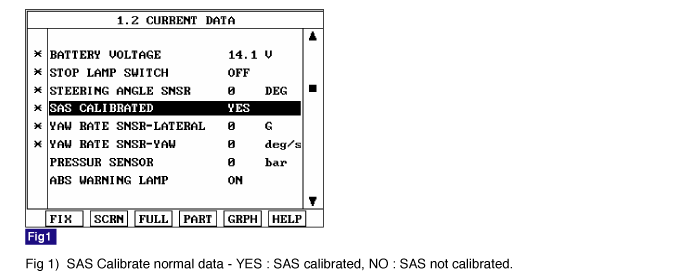Monitor the "SAS CALIBRATED" parameters on the Scantool.
Specification : YES


The Steering angle sensor(SAS) is installed in EPS (Electric Power Steering) and it sends messages to HECU through CAN communication line. The SAS is used to determine turning direction and speed of the steering wheel. The HECU uses the signals from the SAS when performing ESP-related calculations.
The SAS used for ESP control needs 0 set because the SAS measures an absolute angle. 0 set is done by using the scantool device. If abnormal 0 set is detected or no information in SAS is detected, a failure is recognized.
Item | Detecting Condition | Possible cause |
DTC Strategy | ● Signal Monitoring | ● A fail of SAS 0 set |
Monitoring Period | ● During SAS 0 set. | |
Enable Conditions | ● The position of steering wheel is out of specified range (straight positon, a max. error ±5˚) during SAS 0 setting. ● When SAS is not calibrated. | |
Fail Safe | ● Reduced controller function caused by faulty SAS signal. Allow the ABS/EBD control. ● The ESP warning lamp is activated. |
Connect scantool to Data Link Connector(DLC).
Ignition "ON" & Engine "ON".
Monitor the "SAS CALIBRATED" parameters on the Scantool.
Specification : YES

Is parameter displayed within specifications?

▶ Fault is caused by having been repaired and HECU memory was not cleared. Clear the DTC and then go to "Verification Of Vehicle Repair" procedure.

▶ Go to "Component Inspection" procedure.
Line up wheels like (figure 1).
Perform the wheel alignment.
Set the steering wheel so that the wheels point straight ahead.
Go ahead and Go back the vehicle 2~3 times without holding steering wheel.
Connect scantool to Data Link Connector(DLC).
Go in Elec. Power Steering system. (figure 2).
Perform ASP calibration. (figure 3).
Check the condition of "SAS 0 SET" by oprerating the vehicle (turn right and left at least 1 time)

Is "SAS 0 SET" completed normally?

▶ Go to "Verification Of Vehicle Repair" procedure.

▶ Substitute with a known-good HECU and check for proper operation. If problem is corrected, replace HECU and then go to "Verification Of Vehicle Repair" procedure.
After a repair, it is essential to verify that the fault has been corrected.
Connect scantool and select "Diagnostic Trouble Codes (DTCs)" mode
Using a scantool, Clear DTC.
Operate the vehicle within DTC Detecting Condition in General Information
Are any DTCs present?

▶ Go to the applicable troubleshooting procedure.

▶ System performing to specification at this time.